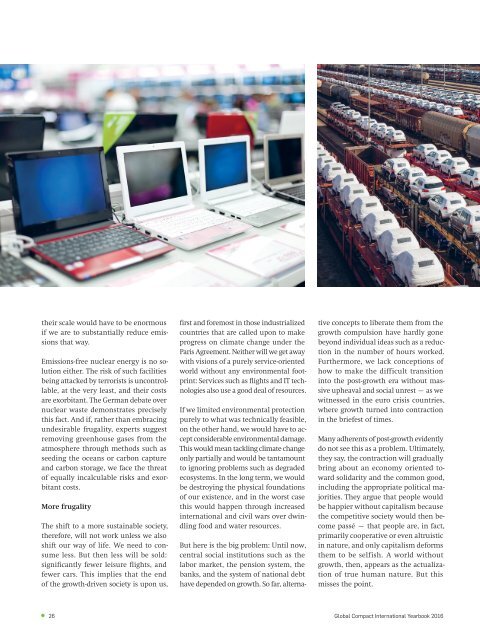Global Compact International Yearbook 2016
The Sustainable Development Goals are an ambitious agenda with 17 topics addressing the global challenges of our time. A key topic is innovation: Business must fit into planetary boundaries. This probably will not work with traditional business models. That is why we need new, fresh ideas. We need change, even when it happens in a rough, disruptive way. And the earlier the better. This is why the upcoming edition of the Global Compact International Yearbook, published in September 2016, has chosen sustainable innovation as the key topic. Also includes exclusive interviews with Angelina Jolie, Robert Redford and Sigourney Weaver. The Global Compact International Yearbook is with more than 500,000 readers one of the worlds leading CSR publications. Münster/New York 2016: 164 pages, paperback Publishing houses: macondo publishing/UN Publications Subscription (via UN Publications only): 30.00 USD (regular) 15.00 USD (reduced) ISBN13: 978-3-946284-01-7 / ISSN-Print: 2365-3396 / ISSN-Internet: 2365-340x
The Sustainable Development Goals are an ambitious agenda with 17 topics addressing the global challenges of our time. A key topic is innovation: Business must fit into planetary boundaries. This probably will not work with traditional business models. That is why we need new, fresh ideas. We need change, even when it happens in a rough, disruptive way. And the earlier the better. This is why the upcoming edition of the Global Compact International Yearbook, published in September 2016, has chosen sustainable innovation as the key topic.
Also includes exclusive interviews with Angelina Jolie, Robert Redford and Sigourney Weaver.
The Global Compact International Yearbook is with more than 500,000 readers one of the worlds leading CSR publications.
Münster/New York 2016: 164 pages, paperback
Publishing houses: macondo publishing/UN Publications
Subscription (via UN Publications only): 30.00 USD (regular) 15.00 USD (reduced)
ISBN13: 978-3-946284-01-7 / ISSN-Print: 2365-3396 / ISSN-Internet: 2365-340x
Create successful ePaper yourself
Turn your PDF publications into a flip-book with our unique Google optimized e-Paper software.
their scale would have to be enormous<br />
if we are to substantially reduce emissions<br />
that way.<br />
Emissions-free nuclear energy is no solution<br />
either. The risk of such facilities<br />
being attacked by terrorists is uncontrollable,<br />
at the very least, and their costs<br />
are exorbitant. The German debate over<br />
nuclear waste demonstrates precisely<br />
this fact. And if, rather than embracing<br />
undesirable frugality, experts suggest<br />
removing greenhouse gases from the<br />
atmosphere through methods such as<br />
seeding the oceans or carbon capture<br />
and carbon storage, we face the threat<br />
of equally incalculable risks and exorbitant<br />
costs.<br />
More frugality<br />
The shift to a more sustainable society,<br />
therefore, will not work unless we also<br />
shift our way of life. We need to consume<br />
less. But then less will be sold:<br />
significantly fewer leisure flights, and<br />
fewer cars. This implies that the end<br />
of the growth-driven society is upon us,<br />
first and foremost in those industrialized<br />
countries that are called upon to make<br />
progress on climate change under the<br />
Paris Agreement. Neither will we get away<br />
with visions of a purely service-oriented<br />
world without any environmental footprint:<br />
Services such as flights and IT technologies<br />
also use a good deal of resources.<br />
If we limited environmental protection<br />
purely to what was technically feasible,<br />
on the other hand, we would have to accept<br />
considerable environmental damage.<br />
This would mean tackling climate change<br />
only partially and would be tantamount<br />
to ignoring problems such as degraded<br />
ecosystems. In the long term, we would<br />
be destroying the physical foundations<br />
of our existence, and in the worst case<br />
this would happen through increased<br />
international and civil wars over dwindling<br />
food and water resources.<br />
But here is the big problem: Until now,<br />
central social institutions such as the<br />
labor market, the pension system, the<br />
banks, and the system of national debt<br />
have depended on growth. So far, alternative<br />
concepts to liberate them from the<br />
growth compulsion have hardly gone<br />
beyond individual ideas such as a reduction<br />
in the number of hours worked.<br />
Furthermore, we lack conceptions of<br />
how to make the difficult transition<br />
into the post-growth era without massive<br />
upheaval and social unrest – as we<br />
witnessed in the euro crisis countries,<br />
where growth turned into contraction<br />
in the briefest of times.<br />
Many adherents of post-growth evidently<br />
do not see this as a problem. Ultimately,<br />
they say, the contraction will gradually<br />
bring about an economy oriented toward<br />
solidarity and the common good,<br />
including the appropriate political majorities.<br />
They argue that people would<br />
be happier without capitalism because<br />
the competitive society would then become<br />
passé – that people are, in fact,<br />
primarily cooperative or even altruistic<br />
in nature, and only capitalism deforms<br />
them to be selfish. A world without<br />
growth, then, appears as the actualization<br />
of true human nature. But this<br />
misses the point.<br />
26<br />
<strong>Global</strong> <strong>Compact</strong> <strong>International</strong> <strong>Yearbook</strong> <strong>2016</strong>

















